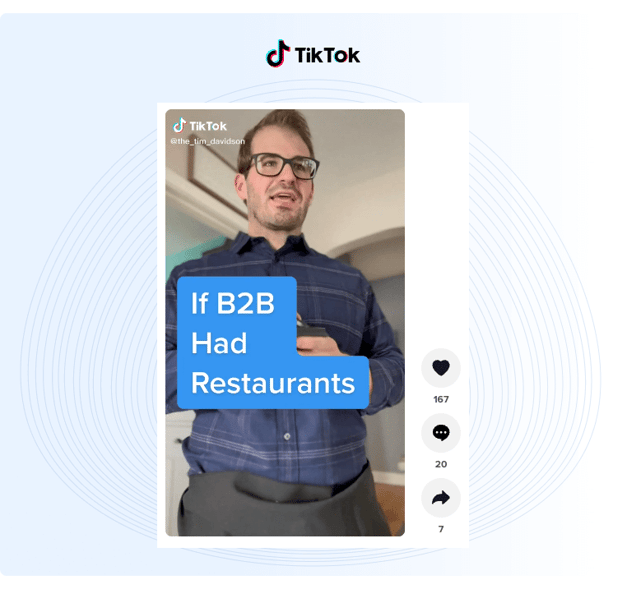Social Media Marketing Statistics for B2B Marketers in 2024
With B2B marketing budgets shifting heavily to digital channels, companies are looking for ways to ramp up their social media platforms. When done well, social media marketing is a powerful tool that helps increase brand awareness, build trust and authority, and influence buyers' purchasing decisions.
Before you pursue new social channels or begin developing new campaigns, it's a good idea to look at the data. In this guide, we've compiled the most compelling social media marketing statistics to help B2B marketers shape their social strategy in 2024.
Which Social Media Platforms Should B2B Marketers Leverage?
If you've landed here, chances are you are considering ramping up your social media marketing efforts. One of the first steps to developing a social media strategy is determining which social media platforms your team is going to focus on.
But, how do you decide which social media sites make the most sense for your business?
LinkedIn is one of the most popular social channels for B2B social media marketers. But, it's not the only channel that provides a strong ROI—especially when you consider social media content trends. Last year, people watched an average of 18 hours of online video per week, which equates to about 154 minutes per day.
This shift in user behavior and high demand for video content has changed the social media landscape. Professionals are searching for product or service video explainers, educational industry videos, webinars, and more.

If you want to take advantage of this trend, consider expanding your social media footprint to Facebook, Twitter, YouTube, TikTok, and other channels that are great for showcasing video.
What Type of Social Content Should Marketers Prioritize in 2024?
Data shows us that video content will be key to unlocking rapid social media growth in 2024.
According to HubSpot, 85% of companies ranked short-form videos as the most effective type of social content, and 64% of marketers plan to invest more in short-form video.
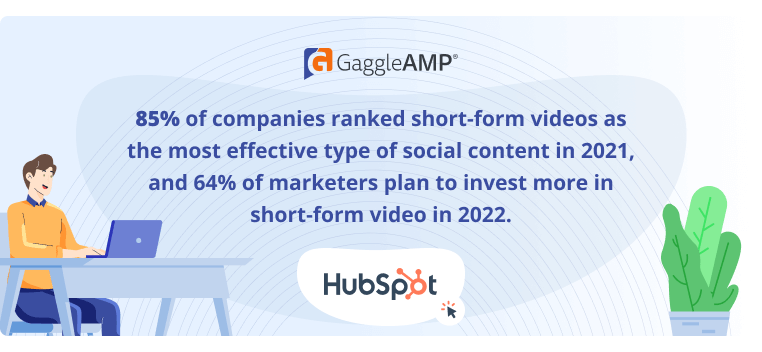 Marketing teams that haven't warmed up to video are usually short on time and resources or are unclear of the ROI. However, when B2B marketing teams that use video were surveyed, 86% said that video has helped increase website traffic, 84% say video has helped them generate leads, and 78% say that video has helped them directly increase sales.
Marketing teams that haven't warmed up to video are usually short on time and resources or are unclear of the ROI. However, when B2B marketing teams that use video were surveyed, 86% said that video has helped increase website traffic, 84% say video has helped them generate leads, and 78% say that video has helped them directly increase sales.
The most common goals that marketers have for video content are:
- Brand awareness (22.4%)
- Product education (21.6%)
- Customer engagement (18.4%)
- Generating leads (18.4%)
- Driving sales (12.1%)
- Highlighting company culture (5.1%)
- Other (2.1%)
The key here is to focus on creating short, quippy, relatable content. In 2021, the average engagement rate for videos under 60 seconds was 51%. That engagement rate steadily decreases as video length increases. Videos that range from 30 to 60 minutes in length only have a 25% engagement rate.
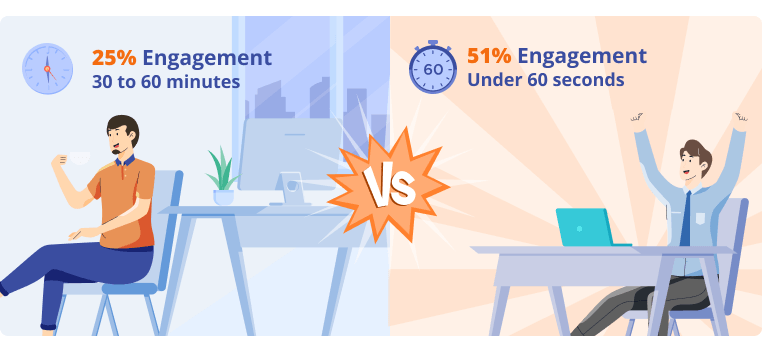 For longer-form videos, consider live streaming or branded video series. Live streaming sessions help bring back the social aspects of business in a digital space—something that many people crave during remote-first times. It's also a great format for Q&As that showcase your brand's customer support chops.
For longer-form videos, consider live streaming or branded video series. Live streaming sessions help bring back the social aspects of business in a digital space—something that many people crave during remote-first times. It's also a great format for Q&As that showcase your brand's customer support chops.
Branded video series can also be a valuable asset that speaks to B2B buyers who are in the consideration or evaluation phase of the buying process.
Social Selling vs Social Media Marketing
Often, the terms "social selling" and "social media marketing" are used interchangeably, but they are actually completely different strategies.
Social selling is a method where a salesperson connects with potential buyers on social media. They will demonstrate an understanding of the buyer's challenges, position themselves as a credible resource, and offer solutions to the potential buyer. The goal is to guide the buyer further down the funnel and eventually make a sale.
Social media marketing, on the other hand, is used to extend brand reach and awareness. This marketing channel is also often used to help position a brand as an authoritative, trustworthy leader in its industry and help drive more leads.
One isn't better than the other. In an ideal world, your team would implement both strategies, alongside an employee advocacy program. When social media marketing is done well, it helps facilitate social selling, both of which support your employee advocacy needs.
Top Social Media Marketing Stats
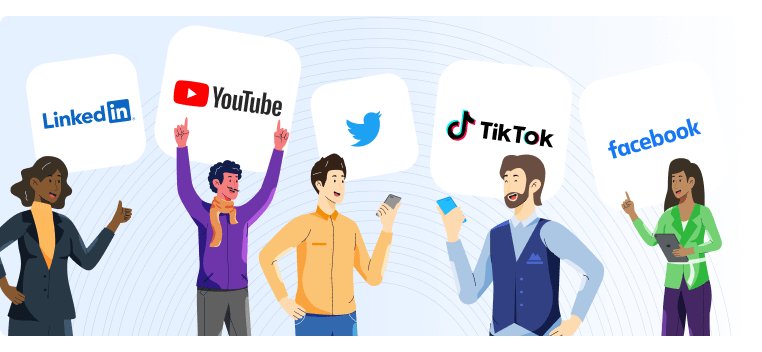 There's no question—social media is an important part of any team's content marketing strategy. Invest your time in the right channels and you'll reap the rewards of increased brand awareness, thought leadership, and industry influence.
There's no question—social media is an important part of any team's content marketing strategy. Invest your time in the right channels and you'll reap the rewards of increased brand awareness, thought leadership, and industry influence.
Most importantly, these success metrics will help create more hand-raisers who are ready to learn about your team's product or solution.
The following social media stats show us that social content is not only great for brand awareness and education, but that it also plays a pivotal role in the B2B sales cycle. When buyers are making a purchasing decision, they often head to social media to find other real-life opinions about a product or service before making a commitment.
- Globally, 47% of internet users ages 16 to 64 have spent more time on social media in 2020 than they did in 2019. (Warc)
- 95% of B2B marketers use social content as a part of their content marketing strategy, making it the most widely-used type of content. (Content Marketing Institute)
- 25% of B2B marketers say that social media content is the highest-performing type of content for building brand awareness. (Content Marketing Institute)
- 91% of B2B marketers use social media to distribute content organically, making it one of the top content distribution channels. (Content Marketing Institute)
- Social media is a source in making purchasing decisions for 84% of B2B executives and 75% of overall B2B buyers. (IDC)
- 50% of marketers plan to increase their investments in Facebook, YouTube, and TikTok —indicating that video content will be huge. (HubSpot)
LinkedIn Social Media Marketing Statistics

LinkedIn is one of the only social media platforms designed for a professional audience, so it should come as no surprise that it's the most widely used platform among B2B marketers.
- 95% of B2B marketers use LinkedIn. (Content Marketing Institute)
- LinkedIn has more than 800 million active users in 200 countries and regions worldwide. (LinkedIn)
- Over 57 million companies have a presence on LinkedIn. (LinkedIn)
- 82% of B2B marketers have reported the greatest success on LinkedIn compared to other social channels. (LinkedIn)
- 79% of B2B marketers who used paid ads on social media said that LinkedIn produced the best results. (Content Marketing Institute)
- 4 in 5 B2B leads from social media come through LinkedIn. (LinkedIn)
- 83% of B2B marketers use Facebook. (Content Marketing Institute)
- Video ads perform better than other ad formats on Facebook. (Databox)
- Facebook is the most popular social media channel for businesses to share video content—even more than YouTube. (Buffer)
- 73% of U.S. adults visit Facebook every day. (HubSpot)
- 98% of Facebook users access the app on mobile. (HubSpot)
- 93% of businesses are active on Facebook. (HubSpot)
- Link posts receive 73% less engagement than video posts. (HubSpot)
- Facebook's median cost per click on paid ads is 10 times cheaper compared to LinkedIn. (Instapage)
- 86% of B2B marketers use Twitter. (Content Marketing Institute)
- 93% of Twitter community members are open to brands getting involved in conversations—particularly to provide help and support. (Twitter)
- 79% of Twitter users follow brands. (Twitter)
- Twitter has the second-highest educated user base in the U.S., with 42% of users having a college education. (Pew Research Center)
- Compared to other social platforms, Twitter users generally have higher spending power. 85% of Twitter users earn more than $30,000 annually, and 34% earn $75,000 or more. (Pew Research Center)
- Tweets with one or more hashtags are 55% more likely to be retweeted. (Buffer)
- 61% of marketers plan to increase their investment in TikTok marketing. (HubSpot)
- TikTok was the most downloaded app globally in 2021, beating Instagram, Facebook, and WhatsApp. (Apptopia)
- TikTok had 1 billion users in 2021, with approximately 53% of users between ages 19-39 and 19% of users over 40. (Business of Apps)
With the number of potential B2B buyers on Linkedin, it's an ideal platform for social selling and leveraging B2B influencers. And while finding the right influencers to partner with for your industry can be a challenge, you already have a relationship with your strongest advocates: your employees!
Your employees are your best advocates and can become influencers for your brand. But, it's important for leadership to set the tone. Encourage employees to share company social media posts. Lead the way by actively engaging with potential buyers. Motivate employees by providing incentives. Read our blog about employee advocacy on LinkedIn for more tips.
Facebook Social Media Marketing Statistics

Facebook isn't just for B2C brands. B2B companies can also tap into their audiences by marketing on Facebook.
Although Facebook ads may not be as targeted as LinkedIn ads, they are significantly cheaper and can still generate significant traffic. For the best results, consider making video ads that are optimized for mobile users.
If your team is focusing on organic social media content, think about creating video content that explains your products or services in a succinct manner. Posting highlight reels or short snippets of a webinar is also a great way to repurpose content you already have on hand.
Twitter Social Media Marketing Statistics

Compared to the number of daily active users on Facebook, some people question why anyone would spend their time marketing on Twitter, which has a much smaller user base.
Due to the social channel's format and real-time nature, Twitter is the ideal space to join in on conversations with customers and potential buyers. Many brands have elevated their customer experience by providing company updates, and by monitoring public conversations and making users feel heard by responding in a timely manner.
YouTube Social Media Marketing Statistics
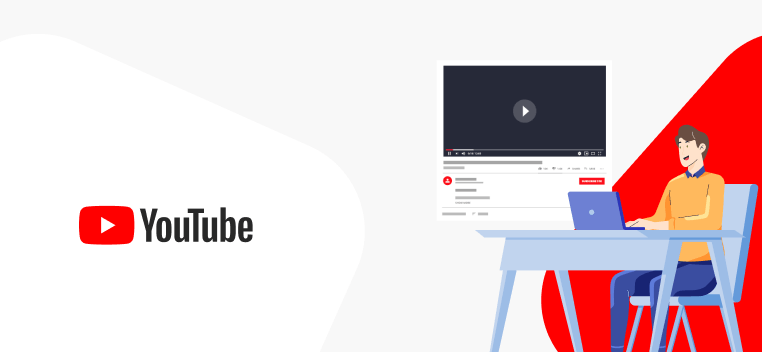
With video being king in 2024, it's only natural that YouTube will be an important platform for marketers to explore. Compared to other social channels, not many B2B marketers are using YouTube as a part of their marketing strategy. This means, depending on your industry, the competition may not be as fierce.
- YouTube is the second-largest search engine globally. (Alexa)
- 53% of B2B marketers use YouTube. (Content Marketing Institute)
- 70% of U.S. Baby Boomers use YouTube, making it the most popular social network among this age group. (Statista)
- 44% of marketers plan to leverage YouTube for the first time. (HubSpot)
While other social channels are pushing short-form video content, YouTube is a great platform for both short-form and long-form video.
In response to TikTok and Instagram Reels, YouTube has created "YouTube Shorts," an app feature that allows users to create 60-second videos. YouTube Shorts are a great way to connect with younger audiences on YouTube who have become more accustomed to short-form content.
For long-form video, product explainers, tutorials, previous webinars, and case studies are all great assets to host on YouTube.
TikTok Social Media Marketing Statistics
TikTok has earned a reputation as the channel for entertaining, quippy, and viral video content. It's been a powerful tool for B2C marketers, but many B2B marketers struggle to figure out how they can leverage this channel in a strategic way.
Don't discount TikTok from your social media marketing plan—there's plenty of opportunity for B2B companies to network, connect with, and engage new audiences on TikTok. Morning Brew, Adobe, and Shopify are just a few examples of B2B companies seeing success with TikTok.
For TikTok, focus on creating relatable content. Unlike other mediums, video content on TikTok doesn't need to be quite so polished. In fact, video that has a casual, unedited look may come across as more authentic and down-to-earth to users—making TikTok a great channel to explore video marketing on a small budget.
How-tos and quick tips work great for the short video format. Content that also highlights your company's culture and personality resonates well with TikTok users. And since there's not as much competition on this platform, it's easier for B2B brands to cut through the noise.
Take hashtags, for example. Since B2B industry hashtags are much more niche, companies who use these types of hashtags and keywords have a much greater chance of being discovered.
Then, there are some professional areas that are blowing up on TikTok. For example, #CareerAdvice is a trending hashtag that drew in over 80 million views in February of 2021 alone. The growth of trending topics like these is just one reason why TikTok has been an ideal platform within the professional space, like for recruiting.
Tips for Growing Your Social Networks and Engaging Your Audience During Digital-First Times
After taking a look at these social media stats, there are a few major takeaways you should keep in mind.
-
Don't limit yourself to only LinkedIn. While LinkedIn is a great channel for B2B marketing, it's not the only social channel you should invest time in. Consider building up other social networks—especially those that encourage social interaction and community building.
-
Prioritize video in your social media strategy. Whether you're a B2B or B2C brand, your audience is craving video content. Short-form video is great for tapping into new audiences, engaging potential buyers, and building brand awareness. Long-form video is great for guiding prospects further down the funnel. Think product tutorials, explainers, and webinars.
-
Build a personal brand. Social media is meant to be social. And with more people working from home, people are leaning on their social media communities for meaningful conversations and connections. This means it's prime time to begin building your personal brand—and it doesn't need to be a time-consuming endeavor. For example, if you want to build your personal brand on LinkedIn, start by posting a couple of times a week. Interact with others in your industry and share helpful content. Traction will build up over time.
-
Transform your employees into brand ambassadors. B2B influencer marketing will be huge this year. You can make your way into this space by empowering your employees to become advocates of your brand. When your employees feel excited to reshare your brand's content and create posts about what work life is like at your company, it's a huge win for brand awareness, shaping public perception, driving stronger company culture, improving internal communications, and even referring rockstar talent to your team.

